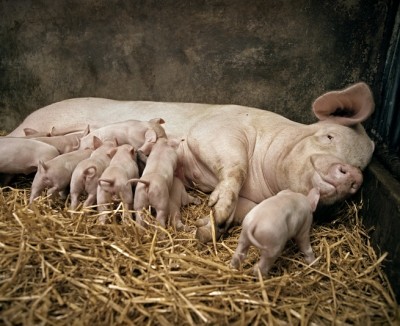‘When mum is not fed appropriately, it has long lasting effects on offspring’

“The true career award, the one that really matters” is how Steven Zinn describes the American Society of Animal Science Morrison award he received last month [July].
Zinn, head and professor in the Department of Animal Science within the College of Agriculture, Health and Natural Resources at the University of Connecticut, was given the award in recognition of his ‘substantial contributions to research related to livestock production’.
Zinn’s field of specialism is growth biology and lactation in cattle, swine and sheep, and the interactions between nutrient intake and hormones. He has been investigating this area for over 30 years and his research efforts have yielded over 95 peer-reviewed manuscripts, two book chapters and over 130 abstracts.
His current research focuses on the effects of maternal nutrition on offspring growth and metabolism both pre- and post-natal.
“We have been studying this for about ten years. We have done a variety of studies but our primary model is to appoint gestating ewes (with twins) to one of three diets: normal, 60% of normal (underfed) and 140% of normal (overfed),” he told FeedNavigator.
He explained that the rationale behind the diets is that the underfed model mimics conditions in autumn, when feed is limited, whereas the overfed model is more representative of producer-fed sheep.
He continued: “They are fed that diet for the length of gestation and we look at the offspring birth rates and size. In a couple of experiments we have collected fetuses at day 30, 60 and 90 so we can look at developmental changes during gestation.”
Once the offspring are born, they are all fed an identical diet to eliminate any dietary variables other than maternal diet.
“That’s the point - what mum eats makes a difference to the offspring even when she isn’t involved anymore.”
Underfeeding and overfeeding yields more fat
Interestingly, the findings for both the 60% and 140% diets were very similar, according to Zinn. While the normal standard diet (set by the National Research Council) develops an efficient animal that is higher in protein and lower in fat, overfeeding and underfeeding the ewes results in offspring with less muscle and more fat, he said.
“Phenotypically they are very similar. We have looked at them at the genomic, cellular and molecular level as well as at whole body measures. It is not nearly as efficient to feed the animal so it puts fat on,” said Zenn.
Furthermore, he said that higher body fat levels were linked to more metabolic problems.
“We are investigating the mechanism responsible for this. Changes in glucose metabolism and insulin sensitivity could both be indicators of metabolic issues,” noted Zinn.
Studying multi-generational impacts
And this work doesn’t stop with first generation offspring. Zinn and his team of researchers, which includes Kristen Govoni and Sarah Reed, are currently investigating how the impacts of maternal diet are passed through multiple generations.
“We have carried out immune system challenges and feed efficiency studies on the first generation of offspring. These suggest that there are some changes in the immune system in the offspring of underfed and overfed ewes. They don’t necessarily get sicker but they have more pro-inflammatory elements which means their immune systems are somewhat compromised,” said Zinn.
“Now we are getting ready to breed the first generation so that we can perform the same tests in second generation offspring. In short, what we’re looking at is how your grandmother’s diet when she was pregnant with your mother could still impact on you,” he said.
Applicable to other livestock
Whilst the studies are all conducted with ewes and their offspring, Zing said that the findings would be applicable to any mammals.
“We perform the studies in sheep populations for monetary efficiency reasons. Cattle are more expensive and take longer to reach gestation, but we would expect to see similar results, namely, if mum is underfed or overfed it may cause problems for the health of offspring and the longer that offspring is around, the more likely it is to suffer metabolic problems.”
He emphasized that the College of Agriculture, Health and Natural Resources isn’t working in isolation in this field.
“There are probably six or seven labs working on this in the US, all with a slightly different focus and different models to avoid replicating effort. For example, one of the groups we work with is very interested in placental function, in other words, how maternal diet impacts on how the placenta works, and its potential mechanisms. We all share our data and findings.”











